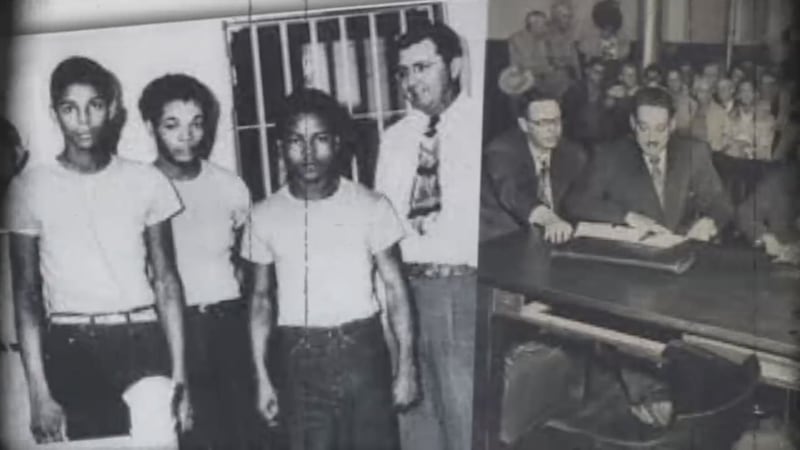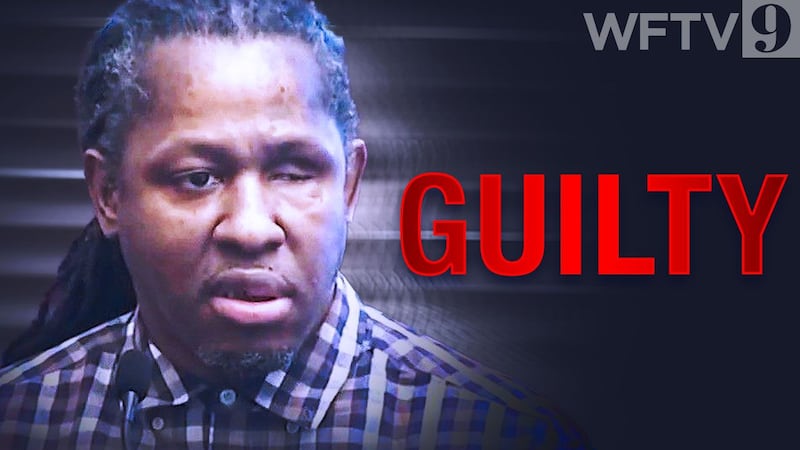LAKE COUNTY, Fla. — A Lake County judge will decide whether to set the record straight in the case of four young Black men who were accused of raping a young white woman in Groveland, Florida in 1949.
Norma Padgett married young and had been out for a fun night of drinking with her husband Willie. Their car broke down on the side of the road. Early the next morning, Norma was spotted at a café in Okahumpka, and claimed four Black men had beaten up her husband, forced her into their car at gunpoint and raped her.
>>> STREAM CHANNEL 9 EYEWITNESS NEWS LIVE <<<
Within hours, Samuel Sheperd and Walter Irvin were arrested. Local law enforcement, led by then-Sheriff Willis McCall, arrested 16-year-old Charles Greenlee and tried to get Ernest Thomas. However, as news spread about the white woman being raped, members of the Ku Klux Klan started a manhunt of their own, tracking down Thomas as he tried to get out of the area. He was shot and killed.
22-year-olds Sheperd and Irvin were buddies, but they didn’t know Greenlee and Thomas.
LIVE UPDATES: Jury finds Markeith Loyd guilty of murdering Orlando police Lt. Debra Clayton
Sheperd, Irvin and Greenlee were tried and convicted by an all-white jury. Greenlee was sentenced to life because of his age at the time of the alleged crime, and Sheperd and Irvin were sentenced to death, but the U.S. Supreme Court overturned their convictions. McCall, unprovoked, shot Irvin and Sheperd on the side of the road while transporting the two from a state prison for their second trial, claiming they tried to escape. Sheperd died.
And now, more than 70 years later, Lake County State Attorney Bill Gladson has filed a motion to dismiss the indictments and set aside judgements and sentences in the case.
“Even a casual review of the record reveals that these four men were deprived of the fundamental due process rights that are afforded to all Americans,” Gladson wrote in his motion. “The evidence strongly suggests that a sheriff, a judge, and prosecutor all but guaranteed guilty verdicts in this case. These officials, disguised as keepers of the peace and masquerading as ministers of justice, disregarded their oaths, and set in motion a series of events that forever destroyed these men, their families, and a community … I have not witnessed a more complete breakdown of the criminal justice system.”
READ: Parents charged after daughter, 2, dies of fentanyl overdose, deputies say
Gladson has been reviewing the case since the Florida Department of Law Enforcement wrapped its investigation into the case. Former Attorney General Pam Bondi requested the agency review the case after the state of Florida issued a posthumous pardon in 2019. Two years earlier, the state offered its first formal apology.
“I don’t think there’s any way you can look at this case and decide the ideals of justice were satisfied, indeed they were perverted time and time again and I think the way this was carried out was a miscarriage of justice,” Governor Ron DeSantis stated during a clemency hearing in 2019.
The FDLE probe focused on tracking down new leads and previously unreported information about the case handled by the Lake County Sheriff’s Office and Groveland police. Further investigating by the state attorney turned up the new evidence, and in some instances previously ignored evidence in the case, even during the trials.
We obtained the interview with the grandson of the original prosecutor in the case, Jesse Hunter, who turned out to be critical for Gladson in his probe. 82-year-old Broward Hunter told the state attorney and FDLE investigator that he first tried to share what he knew back in 2019 after he heard about that clemency board hearing where Padgett begged the board not to extend the pardon, insisting still, the boys raped her.
Police: Pregnant nurse loses unborn baby after being attacked by patient
Broward Hunter had also recently heard about a book written about the case and former Sheriff McCall and emailed the author. “After a dramatic, hourlong meeting, Florida Governor Ron DeSantis and the cabinet granted posthumous pardons to four young black men who were tortured, murdered or wrongly imprisoned for the rape of a white woman in 1949. " They all knew very well that there was no rape,” Hunter wrote. And he provided more details about how he knew that during his interview with the state attorney and FDLE agent. “Your grandfather and the judge in the case, both at the time of the second trial knew that these four men had not committed this rape. Is that a good summary,” Gladson asked Hunter. “Yes, approximately. My grandfather was certainly convinced totally,” Hunter said.
Hunter told the investigators that his grandfather started questioning Padgett’s story after he interviewed Walter Irvin when he sneaked past a deputy guarding his hospital room after he was shot by McCall ahead of his second trial.
“His story was that he and Shepard were Bolita runners, that they were carrying tickets and money from a place in Orlando out to Groveland, you know, paying off people, that that was what this was about…paying people off that was what this was about, and that they had nothing to do with any rape and didn’t know this white girl or anything about her,” Hunter explained.
Sheriff McCall was being investigated, according to Hunter, for his alleged role in the illegal lottery operation.
Hunter told investigators he found old letters in his grandfather’s old law office in Tavares that he’d sent to the Governor back then, detailing a plan to take down McCall. “He knew that that that this was not a rape case that that was known by the governor’s office,” Hunter said.
He says his grandfather pursued the case anyway, largely because everyone feared McCall.
One of the problems during that trial - prosecutors never tested a supposed smear on Irvin’s pants that was allegedly semen, though they could have. FDLE tracked down the pants, and that stain tested negative.
A cast of Irvin’s footprint presented during trial was fabricated by the state’s star witness, Deputy James Yates. “In the second trial, the defense, in addition to attacking the State’s failure to conduct laboratory testing of the stains also challenged Deputy Yates’ qualifications to collect the shoe and tire casts. In fact, the defense expert concluded, and so testified, that Deputy Yates manufactured the foot-casts that linked Walter Irvin to the crime scene in Okahumpka. During cross examination, the defense’s expert witness, H.V. Bennett, testified; “My opinion is ‘that there was no foot in that shoe when the impression was made.” Gladson wrote in his motion to the judge.
Hunter’s testimony is considered new evidence along with the FDLE analysis of Irvin’s pants and the discovery of the fabricated footprints. “That jury was gonna convict that Black man, no matter what happened at trial. That was that was, that was just it. And he made enough mistakes that there should have been, you know, a way to get from that to either a mistrial or a retrial or are some kind of an appeal to get out of that,” Hunter told the investigators.
Click here to download the free WFTV news and weather apps, click here to download the WFTV Now app for your smart TV and click here to stream Channel 9 Eyewitness News live.







